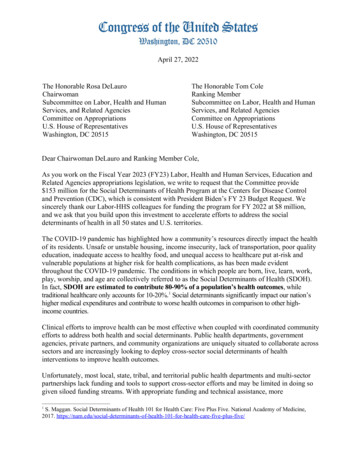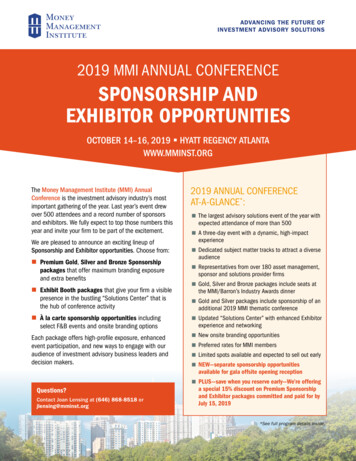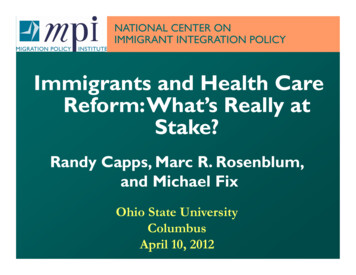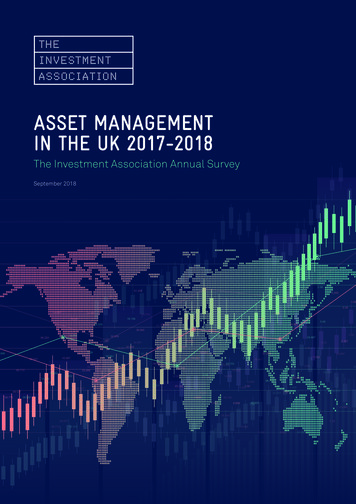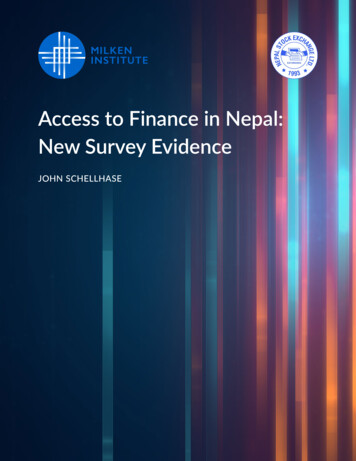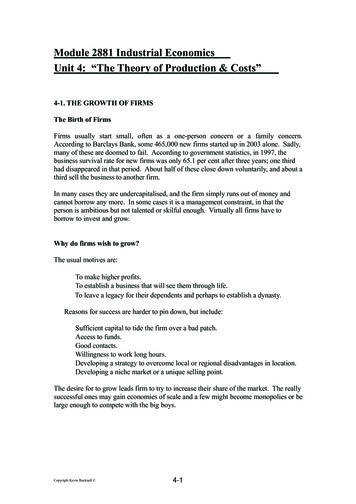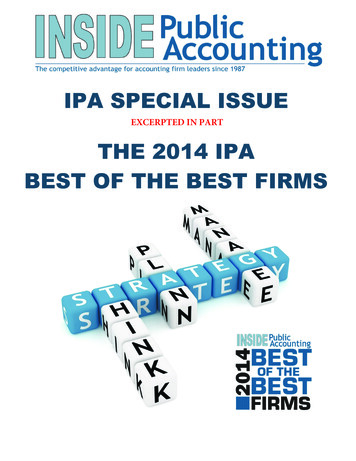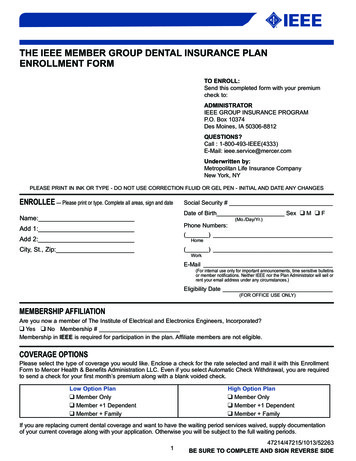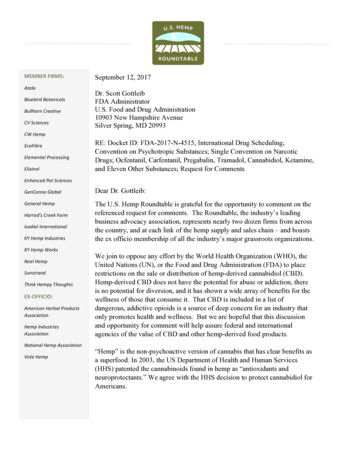
Transcription
MEMBER FIRMS:AtaloBluebird BotanicalsBullhorn CreativeCV SciencesSeptember 12, 2017Dr. Scott GottleibFDA AdministratorU.S. Food and Drug Administration10903 New Hampshire AvenueSilver Spring, MD 20993CW HempEcoFibreElemental ProcessingElixinolRE: Docket ID: FDA-2017-N-4515, International Drug Scheduling;Convention on Psychotropic Substances; Single Convention on NarcoticDrugs; Ocfentanil, Carfentanil, Pregabalin, Tramadol, Cannabidiol, Ketamine,and Eleven Other Substances; Request for CommentsEnhanced Pet SciencesGenCanna GlobalDear Dr. Gottleib:General HempThe U.S. Hemp Roundtable is grateful for the opportunity to comment on thereferenced request for comments. The Roundtable, the industry’s leadingbusiness advocacy association, represents nearly two dozen firms from acrossthe country, and at each link of the hemp supply and sales chain – and boaststhe ex officio membership of all the industry’s major grassroots organizations.Harrod’s Creek FarmIsodiol InternationalKY Hemp IndustriesKY Hemp WorksReal HempSunstrandThink Hempy ThoughtsEX-OFFICIO:American Herbal ProductsAssociationHemp IndustriesAssociationNational Hemp AssociationVote HempWe join to oppose any effort by the World Health Organization (WHO), theUnited Nations (UN), or the Food and Drug Administration (FDA) to placerestrictions on the sale or distribution of hemp-derived cannabidiol (CBD).Hemp-derived CBD does not have the potential for abuse or addiction, thereis no potential for diversion, and it has shown a wide array of benefits for thewellness of those that consume it. That CBD is included in a list ofdangerous, addictive opioids is a source of deep concern for an industry thatonly promotes health and wellness. But we are hopeful that this discussionand opportunity for comment will help assure federal and internationalagencies of the value of CBD and other hemp-derived food products.“Hemp” is the non-psychoactive version of cannabis that has clear benefits asa superfood. In 2003, the US Department of Health and Human Services(HHS) patented the cannabinoids found in hemp as “antioxidants andneuroprotectants.” We agree with the HHS decision to protect cannabidiol forAmericans.
The United States is the largest importer of hemp products in the world. Why? Americans simplyunderstand that hemp and hemp-derived products are helpful and healthful. How has ourcountry responded? Activists have long lauded hemp’s many beneficial products, but decades ofactivism did not bring the desired results.In 2014, Congress passed a seminal piece of legislation addressing the federal disposition ofIndustrial Hemp and Hemp-derived products. Section 7606 of the Agricultural Act of 2014 (2014Farm Bill)1 defines ‘‘industrial hemp’’ as the plant Cannabis sativa L. and any part of suchplant, whether growing or not, with a delta-9 tetrahydrocannabinol concentration of not morethan 0.3 percent on a dry weight basis. Sec. 7606 also allows for the federally legal growth,cultivation, and marketing of Industrial Hemp by states with an Industrial Hemp Research PilotProgram (IHRPP) or via an institution of higher education.The 2014 Farm Bill paved the way for over 30 states to adopt legislation legalizing thecultivation of Industrial Hemp and creating an IHRPP. Subsequent legislation and regulationhave been adopted at the federal and state levels--including Sections 5382 and 7733 of theConsolidated Appropriations Act of 2017 (Public Law No: 115-31 (05/05/2017)--that clearlyaddress the intended definition of Industrial Hemp and Hemp-derived products, such as CBD -cannabidiol. Additionally, the United States Department of Agriculture (USDA) has clearlyopined that hemp and hemp-derived products (including CBD) are federally recognized, legal,and worthy of grants and funding through the auspices of National Institute of Food andAgriculture(NIFA)4.Through the course of human history and in every corner of the globe, Hemp and Hemp derivedproducts have been cultivated and consumed. Prior to the 1930’s, hemp and hemp-derivedproducts had been bought, sold, and transacted in the United States; yet a blanket ban on allthings cannabis put a stop to this in the 1940’s. In more recent times, farmers in the US have hadthe good fortune to be granted the ability--under a tight regulatory framework--to grow hemp andto provide the agricultural commodity basis for the mainstream access to all the beneficialaspects of the magnificent hemp plant.The opportunity for hemp and hemp derived products to once again flourish fits into a globaltrend towards natural botanical products. This trend is reinforced by the actions of the giantpharmaceutical companies: they know that the profiteering from the sleight-of-hand1http://www.votehemp.com/PDF/Pages from farm0127.pdf2(Sec. 538) Prohibits DOJ or the DEA from using funds provided by this division in contravention of a provision of theAgricultural Act of 2014 that permits an institution of higher education or a state department of agriculture to grow or cultivateindustrial hemp for research purposes.3(Sec. 773) Prohibits funds provided by this division from being used: (1) in contravention of a provision of the Agricultural Actof 2014 that permits an institution of higher education or a state department of agriculture to grow or cultivate industrial hemp forresearch purposes; or (2) to prohibit the transportation, processing, sale, or use of industrial hemp that is grown or cultivated inaccordance with the Agricultural Act of 2014, within or outside the state in which it is grown or 08-12/pdf/2016-19146.pdf
manipulations of natural botanical products is close to its end. The public good, nationally andglobally, demands inexpensive access to beneficial food products. Many feel as we do that thisshould be a basic human right.Across the world, botanical products have blossomed as the public has demanded access tobeneficial compounds that are NOT pharmaceutical. Why? Since time immemorial, all peopleson all continents have used plants like hemp in various forms for beneficial reasons like food.To quote Hippocrates: “ Let thy medicine be thy food, and thy food be thy medicine”. In amodern context: the public wants the access to all healthful foods, and the job of governmentalforces is simply to determine the safety parameters for public consumption.This is where the structural problems of the FDA are evident: there are rules and advantagesgiven to the pharmaceutical companies, under the auspices of shepherding the public good, thatinhibit the people from accessing historical botanicals.For CBD derived from hemp, the argument about the public good boils down to psychoactivity.This is easy to address: in the US, legal hemp and hemp-derived products are not psychoactiveand not controlled substances. Hemp is an agricultural commodity and hemp-derived productsare food.Unfortunately for the general public, greater clarification is needed.In the US, cannabis has recently (as of 2014) been broken into two categories: marijuana(Recreational and Medical) and Industrial Hemp. Society demands hemp-derived products, andregulators fear THC. This is easy to understand. Hemp, low in the psychotoxic THC, meets avariety of needs that even conservative folks understand as clearly agricultural in nature. Hempderived products are similar to all other agricultural products. For example, Orange trees thatprovide Oranges (food), Orange Juice (beverage), Vitamin C (nutraceutical), and regulatedpharma grade anhydrous citric acid all share the same origin. Similarly, non-GMO corn providescorn, feed, mash, tortillas, regulated ethanol, and regulated Bourbon.The structure and nature of the FDA forces definition into Food, Drug, Supplements and the greyarea of all the other products not classified. CBD produced from hemp is not a controlledsubstance, so it is clearly not a drug. The FDA, with antiquated rules that only benefitpharmaceutical companies, says that CBD is not a supplement. That means CBD derived fromhemp is food.It is our opinion to let the confusion over marijuana and psychoactive THC run its course. Stateswill act, and at some point, the federal government will recognize that prohibition just makescriminal that which taxation makes legal and profitable. Like alcohol, a regulated distributionsystem will eventually emerge and evolve.But CBD is not THC.Many years ago, the FDA and various international organizations incorrectly used the termmarijuana as a blanket definition for cannabis. This problematic nomenclature has causeddecades of incorrect policy decisions including the FDA’s present stance on CBD derived from
hemp, because it has lumped it in with Marijuana. The result is everything dealing with Cannabis(hemp, etc) is now wholly dependent on the definition and scheduling of marijuana. This globalmis-characterization of cannabis as marijuana has provided only confusion, leading to the currentstate of affairs: Cannabis hemp marijuanaTHC is psychoactive and has many potential benefits.CBD is not psychoactive and has many benefits.Agricultural commodities, like hemp, offer the public many beneficial products.CBD, an agricultural product derived from hemp, is just that. Like broccoli andturmeric, CBD is just a food product.Recently, hemp oils high in cannabinoids such as CBD, have gained fame due to the amazingevidence of the miraculous neuroprotective impact on Charlotte Figi’s life in Colorado, that wasdisplayed to the world by CNN. Now, millions realize that these neuroprotective, antioxidant,and anti-inflammatory benefits extend to a variety of neurological disorders such as mild anxiety,pain from exercise-induced inflammation, and dozens of more applications.However, these stories have been sensationalized and entwined with “marijuana”, as thiscontinues to happen, millions remain confusedIt is therefore our position that:1. The World Health Organization (WHO) should ease international restrictions on CBDand that the FDA should reconsider its position on CBD as a healthful food rather than adangerous controlled substance due to its availability as an agricultural product;2. National and international policy makers must continue to develop reasonable legislationon hemp and hemp derived products in the context of hemp as food. Doing so will ensurethat consumers are protected, the industry’s growth trajectory can continue, new investorswill be attracted, jobs will be created, and safe and reliable products will reach the handsof consumers;3. The economic benefits of hemp and hemp derived products should not be discounted.4. There is no abuse liability and potential for diversion as it relates to hemp and hemp derivedproducts, including CBD--a concern of many in law enforcement. Hemp is an agriculturalcommodity and a food product. Abuse and diversion would not result in much;5. While we certainly support research and development on hemp-derived CBD products,any immediate change in its classification as an agricultural commodity will result in aninability for consumers to access end products and cause unnecessary economicramifications.We urge the FDA to carefully consider this matter and will make ourselves available as aresource to evolve this framework.Sincerely,/sBrian FurnishPresident
U.S. Hemp Roundtable
will be attracted, jobs will be created, and safe and reliable products will reach the hands of consumers; 3. The economic benefits of hemp and hemp derived products should not be discounted. 4. There is no abuse liability and potential for diversion as it relates to hemp and hemp derived products, including CBD--a concern of many in law .
